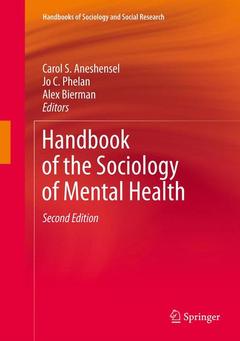Description
Handbook of the Sociology of Mental Health (2nd Ed., 2nd ed. 2013)
Handbooks of Sociology and Social Research Series
Coordinators: Aneshensel Carol S., Phelan Jo C., Bierman Alex
Language: English
Subjects for Handbook of the Sociology of Mental Health:
Keywords
Age Differences in Mental Disorder; Behaviorak Model of Health Service Utilization; Community/ survey; studies of mental illness; Impact of Mental Health on Families; Meanings of Mental Illness; Mental Disorders; Psycchiatric Disorder; Religion and Mental Health; Social Consequences of Personal Control; The Sociology of Work and Well-Being
Publication date: 08-2013
636 p. · 17.8x25.4 cm · Paperback
Publication date: 07-2012
636 p. · 17.8x25.4 cm · Paperback
Description
/li>Contents
/li>Biography
/li>Comment
/li>
This second edition of the Handbook of the Sociology of Mental Health features theory-driven reviews of recent research with a comprehensive approach to the investigation of the ways in which society shapes the mental health of its members and the lives of those who have been diagnosed as having a mental illness
The award-winning Handbook is distinctive in its focus on how the organization and functioning of society influences the occurrence of mental disorder and its consequences. A core issue that runs throughout the text concerns the differential distribution of mental illness across various social strata, defined by status characteristics such as gender, race/ethnicity, socioeconomic status, and age. The contributions to this volume shed light on the social, cultural, and economic factors that explain why some social groups have an elevated risk of disorder. They also address the social repercussions of mental disorder for individuals, including stigmatization within the larger society, and for their families and social networks.
The second edition of this seminal volume includes substantial updates to previous chapters, as well as seven new chapters on: -The Individual?s Experience of Mental Illness.--The Medicalization of Mental Illness.---Age, Aging, and Mental Health.- -Religion and Mental Health.- -Neighborhoods and Mental Health.- -Mental Health and the Law?and Public Beliefs about Mental Illness.
Carol S. Aneshensel is Professor, Department of Community Health Sciences at the Fielding School of Public Health, University of California, Los Angeles. She specializes in the fields of the sociology of mental health and medical sociology, with an emphasis on the social origins of stress and its impact on depression. Her work spans the life course from adolescence through advanced old age. Her most recent work examines the linkages between the socioeconomic stratification and racial/ethnic segregation of neighborhoods and mental health. She has received the Leonard I. Pearlin Award for distinguished contributions to the sociological study of mental health and the Leo G. Reeder Award for distinguished contributions to medical sociology from the American Sociological Association.
Jo C. Phelan is Professor of Sociomedical Sciences and Co-Director of the Center for the Study of Social Inequalities and Health at the Mailman School of Public Health at Columbia University. Her broad research focus is on social inequalities, particularly on the interplay between social structural conditions and social psychological processes in producing, maintaining or changing those inequalities. Her current research interests include socioeconomic inequalities as “fundamental causes” of inequalities in health and mortality; public conceptions of mental illness; and stigma, particularly stigma associated with mental illnesses.
Alex Bierman is Assistant Professor in the Department of Sociology at the University of Calgary. His research is broadly concerned with using mental health as a means to illustrate the importance of structural arrangements for individuals’ lives. His current research interests include examining how social statuses and a life course context intersect to shape the relationship between stressors and mental health. An additional area of inquiry focuses on exploring the social and psychological mechanisms that may help to explain the relationship
These books may interest you

Sociology of Mental Disorder 133.46 €

Sociology of Mental Disorder 236.64 €


